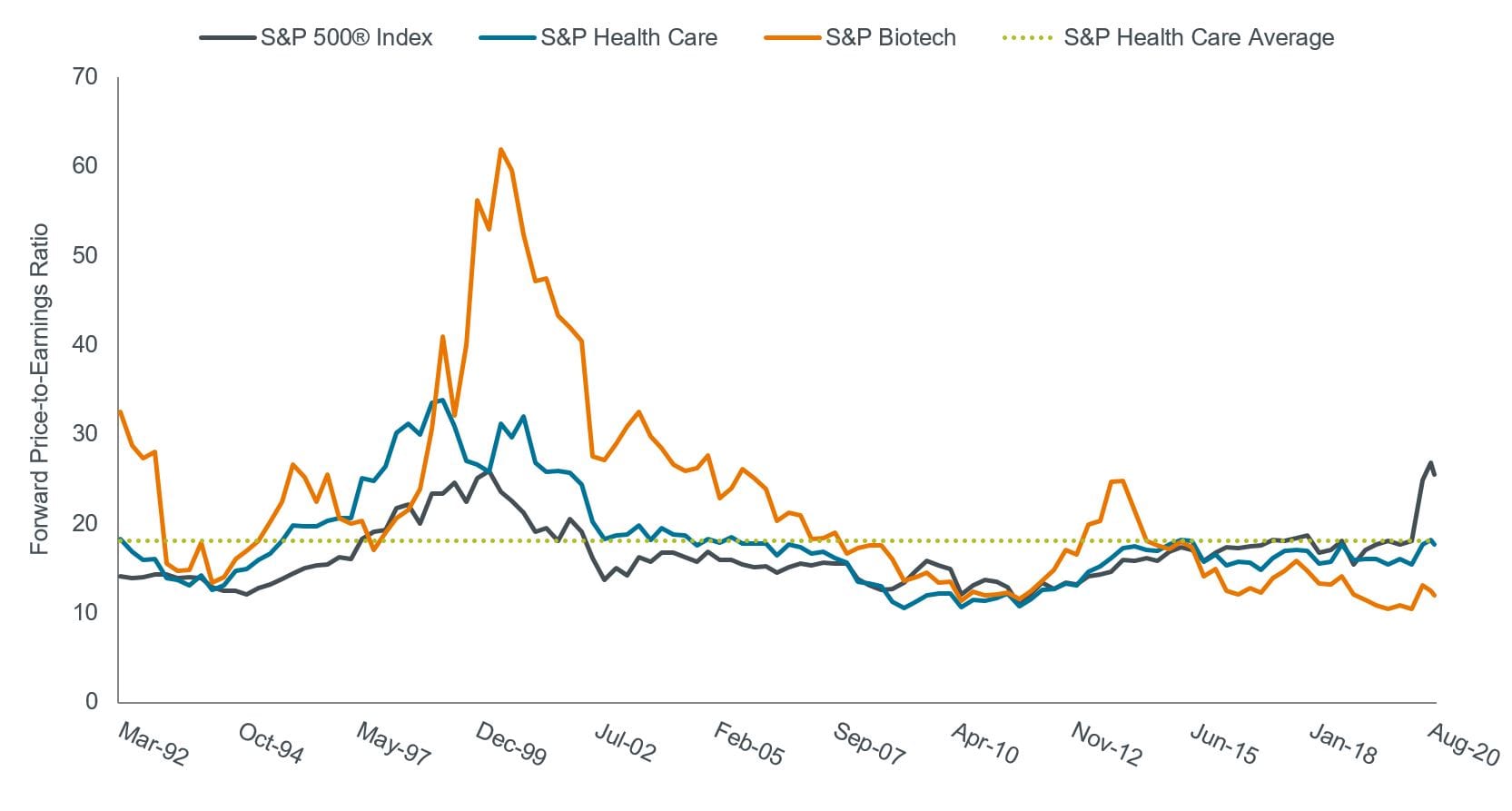Why we think healthcare will continue to run
Healthcare stocks experienced both highs and lows in 2020, with the sector declining in March as the COVID-19 pandemic took hold, then rallying as the biopharmaceutical industry mobilized to combat the virus. The sector pulled back again on U.S. election uncertainty, only to rebound following promising data for COVID-19 vaccines and a more benign election outcome. Now heading into 2021, we believe this upward momentum could have staying power.
Innovation opens new markets
For one, biopharma’s response to COVID-19 has cast a spotlight on the industry’s innovative might. So far, two vaccines – one from Moderna and another jointly developed by BioNTech and Pfizer – have shown to be roughly 95% effective in preventing symptomatic disease in late-stage clinical trials. A third vaccine from AstraZeneca and the University of Oxford could be as much as 90% effective. Even more impressive, the Moderna and BioNTech/Pfizer vaccines use novel messenger RNA (mRNA) technology, and all three vaccines were developed in under a year (compared to historical vaccine development of a decade or longer).
It remains to be seen how much these and other vaccines can add sustainably to the bottom lines of their developers (nearly 50 vaccine candidates are in clinical trials). Even so, the industry’s push to address the COVID-19 crisis – with billions of dollars invested in research and manufacturing – has helped to accelerate and/or validate new technologies. mRNA therapy has been studied for indications such as cancer and infectious disease but, so far, has not earned regulatory approval.
The lessons learned from developing COVID-19 vaccines could be applied to mRNA programs for other vaccines as well as for a variety of cancers and other applications.
mRNA technology is just one example of the type of research now advancing in biopharma. Over the next few years, we expect to see data readouts for gene therapies addressing devastating diseases such as Duchenne muscular dystrophy, hemophilia and cystic fibrosis. We’re also seeing an explosion of cell-based medicines for cancer and rare diseases and precision oncology therapies that take a more targeted approach, including “guided missile” delivery of chemotherapy to tumor cells using antibody-drug conjugates. If successful, many of these medicines could revolutionize the standard of care for important disease categories and open new market opportunities.
The return of M&A
Even as these scientific advances are being made, the sector trades at a substantial discount to the broad market. We believe advancing science, attractive valuations and rock-bottom interest rates could lead to an uptick in merger and acquisition (M&A) activity, especially as many large-cap pharmaceutical and biotechnology firms suffer from aging drug franchises that face looming generic competition.
Healthcare at a discount

Source: Bloomberg, Janus Henderson Investors. Data are quarterly from 31 March 1992 to 30 September 2020. The S&P Health Care sector comprises those companies included in the S&P 500 that are classified as members of the GICS health care sector. S&P Biotech comprises stocks in the S&P Total Market Index that are classified in the GICS biotechnology sub-industry.
Policy risk wanes
The 2020 U.S. election outcome could also prove to benefit healthcare in the coming year. Unlike other Democratic candidates, President-elect Joe Biden has proposed only moderate changes to the U.S. healthcare system, such as expanding the Affordable Care Act (which could drive increased demand for medical care). At the same time, although the balance of power in the 100-seat Senate remains undecided thanks to two runoff races, at best, Democrats can achieve only a simple majority. As such, the Party’s ability to pass sweeping legislation will likely be limited since Senate procedural rules generally require 60 votes to close debate.
That’s not to say pressures for healthcare reform will completely dissipate. Drug pricing remains a focal point not just in Washington, D.C., but also in the private market. Amazon, for example, recently announced an online pharmacy with a new savings card program and free shipping for Prime members. But we believe initiatives that help improve price transparency in drug distribution and compete away fees that add to consumers’ out-of-pocket costs represent a positive development. In fact, while average net prices for prescription drugs have remained relatively flat in recent years, consumer out-of-pocket costs have continued to rise.
Addressing this imbalance could help protect incentives for innovation while improving patient affordability – a win-win, in our view.
Keep your portfolio in good health
Stay up to date with all of our latest insights by clicking the follow button below and you'll be notified every time we post an update on where we are finding the most compelling ideas from around the world.
1 topic

